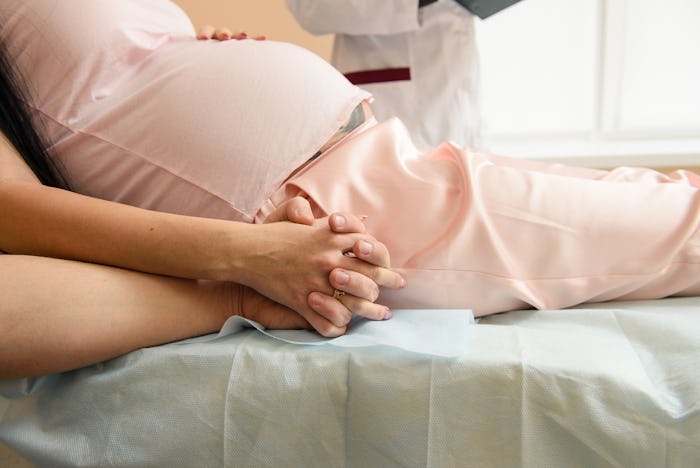Life
Science Says Your Partner Should *Definitely* Be Holding Your Hand During Childbirth
When we first fall in love, expressing affection towards our partner often feels natural and easy, and it's not exactly hard to see why that feels so good — cuddling can help us feel happier and closer to one another, in part because it produces the same kind of hormonal response that helps new mothers feel bonded to their babies. But a recent study has found that there's more to physical touch than just oxytocin: researchers at the University of Colorado at Boulder found that holding hands with your partner eases pain by syncing your brainwaves, according to Science Daily. And given that hand-holding takes basically zero effort? That's hopefully something that even the most PDA-averse partners can get behind.
In the study, published recently in Proceedings of the National Academy of Sciences, researchers measured the brainwave of 22 heterosexual couples while they experienced different levels of physical touch. The couples (who were all between the ages of 23 and 32, and who had all been together for at least one year) were studied in three different scenarios: sitting together, but not touching; sitting together while holding hands; and sitting in separate rooms, according to Science Daily. The same scenarios were then repeated, except this time, each woman was subjected to "pain" (specifically, mild heat on her arm).
Although researchers found that all the couples showed signs of some brain wave synchronicity simply by being placed in the same room as one another (ah, love), that synchronicity increased if they were touching, and the more empathy the male partner felt while he was touching his partner, the more brain synchronicity the couple experienced. What's perhaps most notable though? That synchronicity actually translated into a decreased pain response, with the women who received the most empathetic touch from their partners experiencing the least amount of pain.
To be fair, the study itself was small, and the authors did emphasize that further investigation is needed (could the same be said with same-sex couples, for example, or perhaps two people who don't actually share a romantic bond?). But even the notion that simple, loving touch can influence the way women feel pain is pretty revolutionary — especially since, well, women often experience some pretty painful things.
One obvious application of the study's findings? Childbirth, which can be absolutely brutal pain-wise. While there are a variety of options available to mothers to try and ease that misery (epidurals, breathing exercises, massage, warm water immersion, hypnosis, etc.), the study makes a pretty good case for male birth partners offering up as much affection and loving touch as possible to laboring women, because it really can make a difference (sync those brainwaves, dads!).
In fact, study author Pavel Goldstein, a postdoctoral pain researcher at UC Boulder, explained to The Daily Mail that it was his own experience as a nervous dad trying to comfort his wife while she was giving birth to their daughter that served as the inspiration for the study. Goldstein explained,
I was in the delivery room, and I felt like I didn't know how I could help my wife. She asked me to hold her hand, not to speak too much, just to hold her hand, and that was very helpful to her. ... I wanted to test it out in the lab: Can one really decrease pain with touch, and if so, how?
The study isn't just valuable when it comes to childbirth though. Pregnancy, for one, can also often be incredibly uncomfortable, and it's helpful for men to understand that being responsive and affectionate to their partners can help make that experience easier. And after University College London reproductive health professor John Guillebaud recently confirmed to Quartz what far too many women have been arguing for far too long — that menstrual pain is very real, and can be "almost as bad as having a heart attack" — the study is also an important reminder to men that, beyond just acknowledging their partners' pain and taking it seriously, they could actually help make it a little bit less terrible by dialing up the empathy and pouring on the love.
In general though, it's also pretty powerful to consider the ways in which our emotional connections with others can have measurable physical effects: not only did this most recent study find that couples' brain waves sync when they are around each other, but a previous study from the same group of researchers in 2017 found that their heart rates and respiratory rates also align, according to UC Boulder. In fact, it's also thought that any two people who share a good rapport will "fall into a similar pattern" brainwave wise, regardless of their relationship to each other.
Of course, if you're a woman in a relationship with a man who isn't at all big on hand-holding or other types of romantic affection, the study's findings might not seem entirely helpful. At the same time though, the results make a pretty strong argument that, far from simply being romantic gestures, affectionate touch actually offers men the opportunity to ease their partners' physical pain. That's pretty impressive — and hopefully that will serve as enough motivation for men to step it up.
Check out Romper's new video series, Bearing The Motherload, where disagreeing parents from different sides of an issue sit down with a mediator and talk about how to support (and not judge) each other’s parenting perspectives. New episodes air Mondays on Facebook.
